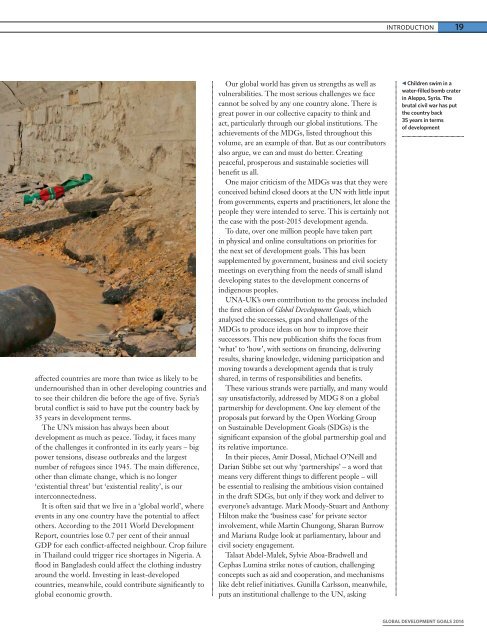FAMBB
FAMBB
FAMBB
You also want an ePaper? Increase the reach of your titles
YUMPU automatically turns print PDFs into web optimized ePapers that Google loves.
INTRODUCTION19affected countries are more than twice as likely to beundernourished than in other developing countries andto see their children die before the age of five. Syria’sbrutal conflict is said to have put the country back by35 years in development terms.The UN’s mission has always been aboutdevelopment as much as peace. Today, it faces manyof the challenges it confronted in its early years – bigpower tensions, disease outbreaks and the largestnumber of refugees since 1945. The main difference,other than climate change, which is no longer‘existential threat’ but ‘existential reality’, is ourinterconnectedness.It is often said that we live in a ‘global world’, whereevents in any one country have the potential to affectothers. According to the 2011 World DevelopmentReport, countries lose 0.7 per cent of their annualGDP for each conflict-affected neighbour. Crop failurein Thailand could trigger rice shortages in Nigeria. Aflood in Bangladesh could affect the clothing industryaround the world. Investing in least-developedcountries, meanwhile, could contribute significantly toglobal economic growth.Our global world has given us strengths as well asvulnerabilities. The most serious challenges we facecannot be solved by any one country alone. There isgreat power in our collective capacity to think andact, particularly through our global institutions. Theachievements of the MDGs, listed throughout thisvolume, are an example of that. But as our contributorsalso argue, we can and must do better. Creatingpeaceful, prosperous and sustainable societies willbenefit us all.One major criticism of the MDGs was that they wereconceived behind closed doors at the UN with little inputfrom governments, experts and practitioners, let alone thepeople they were intended to serve. This is certainly notthe case with the post-2015 development agenda.To date, over one million people have taken partin physical and online consultations on priorities forthe next set of development goals. This has beensupplemented by government, business and civil societymeetings on everything from the needs of small islanddeveloping states to the development concerns ofindigenous peoples.UNA-UK’s own contribution to the process includedthe first edition of Global Development Goals, whichanalysed the successes, gaps and challenges of theMDGs to produce ideas on how to improve theirsuccessors. This new publication shifts the focus from‘what’ to ‘how’, with sections on financing, deliveringresults, sharing knowledge, widening participation andmoving towards a development agenda that is trulyshared, in terms of responsibilities and benefits.These various strands were partially, and many wouldsay unsatisfactorily, addressed by MDG 8 on a globalpartnership for development. One key element of theproposals put forward by the Open Working Groupon Sustainable Development Goals (SDGs) is thesignificant expansion of the global partnership goal andits relative importance.In their pieces, Amir Dossal, Michael O’Neill andDarian Stibbe set out why ‘partnerships’ – a word thatmeans very different things to different people – willbe essential to realising the ambitious vision containedin the draft SDGs, but only if they work and deliver toeveryone’s advantage. Mark Moody-Stuart and AnthonyHilton make the ‘business case’ for private sectorinvolvement, while Martin Chungong, Sharan Burrowand Mariana Rudge look at parliamentary, labour andcivil society engagement.Talaat Abdel-Malek, Sylvie Aboa-Bradwell andCephas Lumina strike notes of caution, challengingconcepts such as aid and cooperation, and mechanismslike debt relief initiatives. Gunilla Carlsson, meanwhile,puts an institutional challenge to the UN, askingChildren swim in awater-filled bomb craterin Aleppo, Syria. Thebrutal civil war has putthe country back35 years in termsof developmentGLOBAL DEVELOPMENT GOALS 2014


